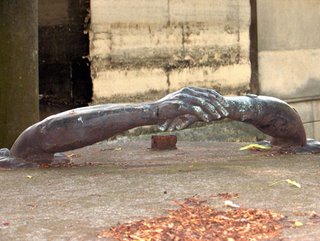Talking about Death - Western Culture II

According to Aries, society erected a system of defences among them religion, morality, government, law, even technology against the uncontrollable forces of nature, but these defences were not impregnable: "This bulwark erected against nature had two weak spots, love and death, through which a little of the savage violence always leaked."
Society restrained sexuality and death by means of taboos and reutilization, all of which subjected the individual to the control of the collective. Nevertheless, individuality proved stronger than the social forces that sought to control it.
Before the Middle Ages, death was part of the universal order. The body was returned to the earth, with no attempt made to commemorate, or even to locate the site. Only with the break from collective life did burial traditions change as individuality emerged in life, so did it emerge in death. The transition was not immediate; in fact it took place over centuries. Individuality, in death and in life, emerged first in the upper strata of society, and only over time in the lower. It is only in the 20th century that nearly every member of Western society has attained a personal burial space.
Individuality emerged after death as well.


<< Home